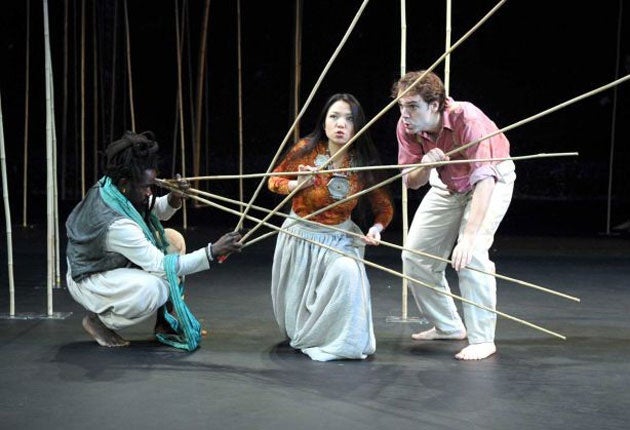Une Flûte Enchantée, Bouffes du Nord, Paris
Brook's magic dust lights up a classic

Peter Brook's theatre is suffused with light. The walls glow red. The rococo balconies are crammed with witnesses. The lovelorn Pamina and the birdman Papageno, separately alone in the dark of danger, have been trapped in fear and foreboding. But the high priest Sarastro explains that all will be solved and forgiven within these sacred walls. And a forest of bamboo sticks is swept away in a moment, all obstruction removed, as sure as the sun follows night.
The title is important. This is A Magic Flute not The Magic Flute; a free adaptation of Mozart and Shikaneder by Brook, the composer Franck Krawczyk and author Marie-Hélène Estienne; they seek to remove the rubble of opera house production and free the "essence" of the piece.
The problem with A Magic Flute is that the fairytale, the pantomime, is of the essence: the condition of the characters – what is their situation, exactly, why do they have to suffer so much? – depends on them knowing they are inside the fable, not demonstrating it. Brook and his actors overcome this self-imposed handicap by playing with a hushed and unremitting intensity, without toppling into bathos or absurdity.
Unavoidably, Thomas Dolié's enchanting Papageno is served a comeuppance by Papagena (Dima Bawab), throwing off an old crone's disguise and laying him flat out on a trolley, legs akimbo (Papagena's propagating proper gander).
But the solemn conjunction of Chinese soprano Lei Xu's beautiful Pamina and Adrian Strooper's grave Tamino is magically enacted as a simple procession in profile through four ground-level burning bowls, emerging in the harsh natural light of reality, downstage of Krawczyk seated alone at the baby grand piano.
And that's it: one piano, no amplification, barefooted actors, and this forest of sticks, free-standing on square metal bases, mobilised to suggest emotional thickets and temple promenades by two benign African "comédiens", William Nadylam and Abdou Ouologuem.
These two represent the spirit of the place, so that Malia Bendi-Merad's unexotic Queen of the Night – her coloratura extravagance "argued" locally, not to a gallery claque, much of it sung upstage – and Raphaël Brémard's unpleasant Monostatos, are designated "bad news", not tribal adventurers.
The score, sung in German, and the dialogue, spoken in French, twists meaning, and obviously loses the wonderful orchestral colour of the original. But compensations are considerable, and often revelatory, especially when Sarastro's great bass arias, sung with assurance by Luc Bertin-Hugault, dressed in a black cassock and purple tippet, promise more in the realms of human happiness than in a life of secret handshakes among the Freemasons.
Much of the show's apparatus – the carpets, the sticks, the spiritual concentration – are familiar from all of Brook's work dating from The Mahabharata over 20 years ago. But the transcendent music, and the cast of rotating singers, takes that work onto a rare new plateau.
To 31 December (00-331 4607 3450; www.bouffesdunord.com)
Join our commenting forum
Join thought-provoking conversations, follow other Independent readers and see their replies
Comments
Bookmark popover
Removed from bookmarks